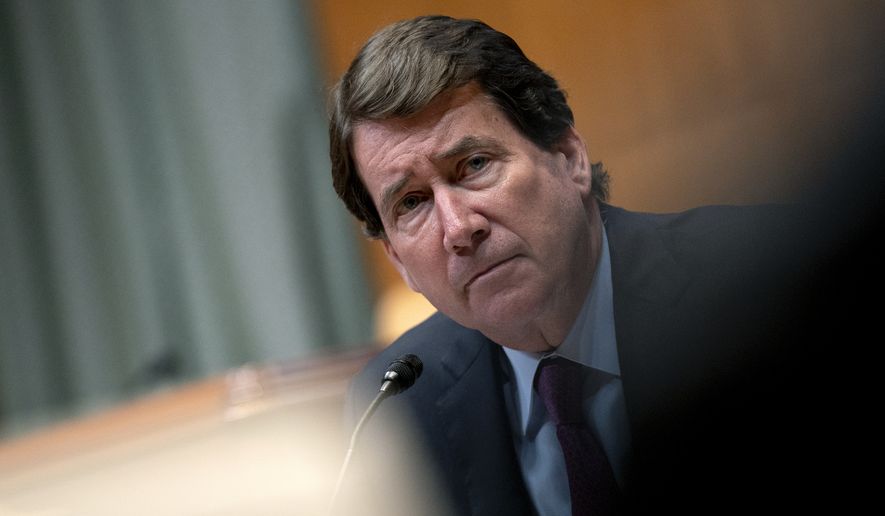America’s European allies fear an increased risk of terrorism and a growing humanitarian crisis amid the fallout from the Afghanistan withdrawal, according to a member of the Senate Foreign Relations Committee who recently met representatives from several key partners.
Republican Sen. Bill Hagerty, who previously served as ambassador to Japan, said he organized last week’s trip overseas out of concern for the impact the withdrawal could have on U.S. relationships with some of the country’s closest allies, and to hear their concerns about future commitments.
“What I heard was the fact that our alliances have been shaken to the core, that they were, rightly or wrongly, blindsided by this,” Mr. Hagerty said in an interview. “I think there’s a real internal reckoning happening, particularly in the U.K.”
Mr. Hagerty said that European allies expressed concerns that the Biden administration had handed the Taliban and terrorist organizations a “huge propaganda victory” and that adversaries like China, Russia, North Korea and Iran will use the victory to undercut the strength of U.S. alliances abroad.
“I think that we’ve … put ourselves in a situation where that sort of propaganda will continue to mount,” he said. “We just saw China enter Taiwanese airspace again on Sunday with 19 aircraft. I think they’re going to keep testing us, and the situation in Afghanistan does not help that.”
“On a more regional level, what’s happened in Afghanistan is a vacuum has been created,” he said. “And that vacuum is going to draw jihadists from around the world. They’re declaring victory against America.”
During his trip across the Atlantic, Mr. Hagerty met with British Defense Minister Ben Wallace and senior parliamentary figures dealing with defense and security issues. He also met with NATO representatives from the U.K., Italy, Germany and Turkey.
“I think they were very frank with me,” Mr. Hagerty said. “They shared their concerns and frustrations but they also agreed that we have now a bigger problem than any of us had anticipated and it’s going to be incumbent upon us to find ways to work together to address it.”
He said many of the leaders he spoke with were concerned that the troop withdrawal was a political calculation by Mr. Biden ahead of the 20th anniversary of 9/11, rather than a judgment based on conditions on the ground in Afghanistan.
“What is really frustrating, then, on top of that is they can see, just as we do, the efforts the Biden administration takes to spin it, to cast blame in other places, to not just step up, own it and fix it,” Mr. Hagerty said.
Tom Tugendhat, who chairs the defense committee in Britain’s Parliament and met with the congressional delegation, has been outspoken about his discontent with the war’s end.
During a mid-August session of the House of Commons at the height of the U.S. military’s scramble to fully withdraw, Mr. Tugendhat, a veteran of the Afghanistan War who served alongside the U.S. Army’s 82nd Airborne, said he was shocked by Mr. Biden’s comments that he said called into doubt the Afghan security forces as the country fell to the Taliban.
“To see their commander in chief call into question the courage of men I fought with, to claim that they ran. It’s shameful,” Mr. Tugendhat said. “Those who have never fought for the colors they fly should be careful about criticizing those who have.”
In the same speech, Mr. Tugendhat decried the larger coalition’s succumbing to the U.S.’ unilateral decision to withdraw, what he said was a lack of resolve to bring about an acceptable outcome to the war.
Mr. Hagerty said Mr. Tugendhat’s frustration echoed that of many Americans. He said many veterans both in his home state of Tennessee and across the U.S. have been questioning whether their sacrifices were worth it after the country fell into the hands of the Taliban.
“That frustration is palpable here to me, and clearly it’s palpable there,” Mr. Hagerty said. “I think [Mr. Tugendhat] was the one that articulated it the strongest to me.”
Mr. Hagerty said those he spoke with, especially the NATO officials, expressed concern over the burgeoning humanitarian crisis as a result of the withdrawal.
“Each of those countries has their own domestic political concerns, economic concerns, national security concerns, and they are deeply concerned that the destabilization of Afghanistan is going to result in a new wave and a new flood of refugees that they’re not, they’re not positioned to handle,” he said.
He said the humanitarian situation has the potential to destabilize countries that feel they are more likely to be met with the brunt of the crisis given their proximity to Afghanistan.
“What they implied was that we make the decisions, and they’ve got to foot the bill for it,” he said. “We make a decision to pull out in a disorderly manner, we allow the nation to collapse and they’re the ones that are going to suffer the brunt of the consequences.”
Mr. Hagerty said the withdrawal has put alliances to the test. He said it is as important as ever to work together to address the emerging threats and to reassure allies abroad of the nation’s resolve.
“I mean a big part of leadership is showing up sometimes and being willing to listen to our allies, to talk to them and get their perspective,” Mr. Hagerty said. “We need to learn from this, learn from the experience here. But we need to double down on our alliance and work on ways to strengthen it.”
• Joseph Clark can be reached at jclark@washingtontimes.com.




Please read our comment policy before commenting.